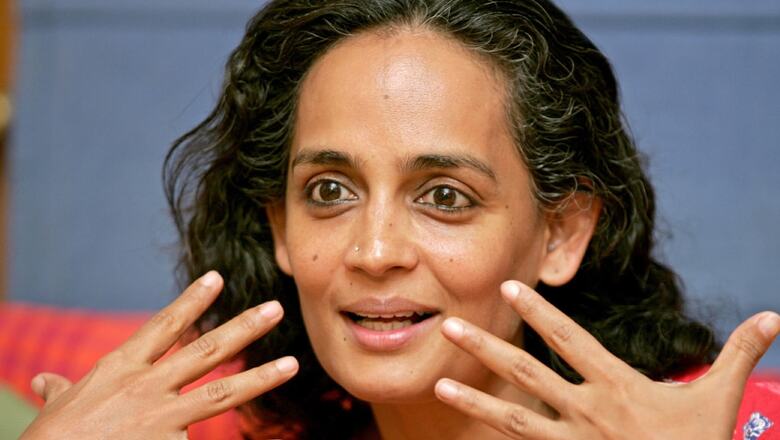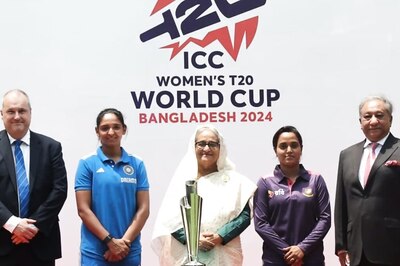
views
Renowned author Arundhati Roy, in her address at the 45th Prix Européen de l’Essai held in Lausanne, Switzerland on September 12, 2023, delivered a speech laden with inaccuracies pertaining to a fictitious scenario involving Bharat. This occasion, which saw Roy being honoured with the Lifetime Achievement award, was seized as an opportunity to present a narrative that was, regrettably, divorced from reality. Specific incidents were erroneously generalised to depict an overly bleak image of Bharat before a global audience.
The interview in question displays a notable bias towards Bharat’s democratic system, with a particular emphasis on the country’s second-largest community. This approach has the potential to generate sympathy for the Leftist-Islamist extremist faction. A group stands accused of actively seeking to disrupt Bharat’s societal harmony through the selective narration and manipulation of various incidents.
Arundhati Roy’s apparent objective, as discerned from her address, appears to be the vilification of Bharat through the introduction of a narrative rooted in fictitious suffering, which she attributes to the entire Muslim community. This deliberate misrepresentation serves to further polarise an already complex socio-political landscape.
It is essential to approach such narratives with a discerning eye, considering a multiplicity of perspectives to form a comprehensive understanding of the situation at hand. By engaging in constructive discourse, we can strive towards a more nuanced and informed societal dialogue.
A Closer Look at Deceptive Information
Commencing from delineation to the awakening in a particularly tumultuous period in Bharat, Roy persisted in her indictment against the democratic framework of the nation, contending that if one identifies as a Muslim, the legal apparatus is administered disparately. It is imperative to underscore that the democratic ethos of Bharat accords equal recognition to all its citizens, with no differentiation in the application of the law based on faith. There exists no recorded instance in Bharat where legal prescriptions have been selectively applied on the grounds of religious affiliation.
Assertions contending that Muslims endure dehumanisation due to their religious beliefs lack substantive evidential substantiation, relying primarily on a limited set of narratives disseminated through social media platforms to implicate the government. Roy astutely insinuated that Prime Minister Narendra Modi, being affiliated with the RSS, an organisation historically disinclined to hoisting the Tiranga and displaying limited deference towards the constitution. However, it is noteworthy that the RSS has adopted the practice of displaying the national flag at its premises. Simultaneously, Narendra Modi, in his capacity as a Prime Minister of India, initiated the “har ghar tiranga” campaign.
NRC, CAA and Shaheen Bagh Protest
It is unmistakably evident that Roy’s agenda was to propagate misinformation about Bharat’s flourishing democracy, which has exhibited remarkable progress in recent years. Roy adroitly attempts to confine the scope of the National Register of Citizens (NRC) to Assam exclusively, notwithstanding the fact that the terminology inherently suggests a broader national applicability.
Persisting in her misrepresentations, she levels accusations that the Citizenship Amendment Act (CAA) was introduced with the primary aim of first deregistering all Bharat citizens, followed by a government determination of their authenticity. However, upon a meticulous examination of the CAA, it becomes apparent that its objective was to extend Bharat citizenship to non-Muslim refugees, in alignment with the wishes articulated by Mahatma Gandhi, offering them sanctuary and Indian citizenship should they seek refuge and choose to settle in Bharat.
Arundhati Roy falsely claims Bharat is building city-sized detention centres for Muslims. In reality, only smaller facilities exist, mainly in Assam, for illegal immigrants, addressing local concerns. These are not related to actual Indian citizens.
In her analysis, Roy interprets the 2020 Citizenship Amendment Act (CAA) protest in Bharat, asserting that the Hindu right-wing, allegedly aided by law enforcement, played a role in fomenting a riot to quell dissent. She omits crucial context regarding the underlying factors that contributed to the unrest. Furthermore, Roy overlooks the significant disruption caused by the 100-day-long protest at Shaheen Bagh in Delhi, which led to unlawful road blockages and the forced closure of businesses. A comparable demonstration in northeast Delhi escalated into a violent clash, resulting in casualties from both Hindu and Muslim communities. However, Roy’s narrative predominantly focuses on the impact on Muslims, potentially providing a skewed perspective on the event.
Covid-19: Examining Empathy and Critique
Arundhati Roy exhibits empathy towards Muslims facing unwarranted blame for Covid-19 transmission, particularly in the case of the Tableegh Jama’at’s non-compliance with lockdown measures. While attributing responsibility for the virus’ spread to the entire Muslim community, Roy astutely overlooks the misconduct of Jama’at members towards healthcare workers during their quarantine.
Throughout her session, Roy does not address concerns related to the non-Muslim community, even though the Covid virus’ rapid spread posed a significant threat to public health and safety. It is noteworthy that Roy did not endorse the decision for a lockdown, asserting that it allowed insufficient time for preparation. However, in the face of a spreading virus, swift and decisive action was imperative to curtail its transmission. Bharat notably implemented a one-day lockdown (Janata Curfew), providing a valuable experience of its potential effectiveness prior to the continuous lockdown, however, Roy had failed to mention this.
Deliberate Attempt to Portray Bharat as a Fascist Nation
Bharat, a diverse nation of varied faiths, cultures, and languages, stands as the world’s largest democracy, providing equal opportunities for all its citizens to prosper and coexist harmoniously. Regrettably, a few people have exploited this fairness, tarnishing the nation’s environment. I’ve outlined the points Arundhati Roy raised during her speech, where she endeavours to extrapolate specific situations to a broader context. Any attentive Indian listener can discern that her narrative does not reflect the reality of our nation; instead, it serves her agenda to paint a distorted picture of growing fascism. It is crucial for us to scrutinise such voices and discern deliberate distortions, ensuring we are not swayed by nonexistent narratives.
As a Muslim residing in Bharat, I have personally experienced no bias in the application of constitutional rights that our nation affords to its citizens. It is important to acknowledge that individuals who engage in activities that threaten the unity of Bharat and involve themselves in illegal pursuits are rightfully addressed without regard to their religious identity. It is incumbent upon Muslims to recognise and appreciate that scrutinising and verifying any selective narrative is essential before levying accusations and voicing opposition against perceived mistreatment and injustice. This discerning approach ensures a more balanced and informed perspective on matters of national significance.
The author is a nationalist Indian Muslim, a student of Philosophy and a researcher in the Quran and Islamic theology, having in-depth knowledge in Islam. Views expressed in the above piece are personal and solely that of the author. They do not necessarily reflect News18’s views.

















Comments
0 comment